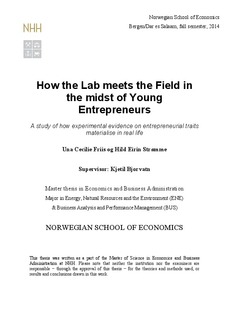How the Lab meets the Field in the midst of Young Entrepreneurs : A study of how experimental evidence on entrepreneurial traits materialise in real life
Master thesis
Permanent lenke
http://hdl.handle.net/11250/275813Utgivelsesdato
2014Metadata
Vis full innførselSamlinger
- Master Thesis [4372]
Sammendrag
Researchers finding answers to economic questions have in the last decades increasingly
been using experimental methods to do so. The link between the laboratory evidence and
how this is extrapolated to the outside world is, however, still an unexplored area in
literature. Many lab experiments have been dedicated to analysing people´s inclination to
compete in a laboratory setting, but few have explored how this and other entrepreneurial
traits materialise in the field. In a setting of young entrepreneurs establishing their businesses
in urban Tanzania, we analyse how their laboratory profile corresponds to field outcomes
and choices. The lab evidence is on business knowledge and skills, time preferences,
competitiveness, willingness to take risk, self-confidence, and finally, ambitions to become
an entrepreneur. The evidence on field outcomes is on business survival, sales and profits,
while the evidence on business choices is on investment, business purchases and savings.
We expand the quantitative analysis by telling the story of the participants, and the
contextual constraints that they face.
We find a strong association between competitiveness and sales, and to some degree also
profits, and with investment choices in the field. We find less consistent association with
some of the other lab evidence. Our findings thus suggest that competitiveness is a key
entrepreneurial trait to shape outcomes and choices. We find knowledge to be the most
important predictor of higher savings.
